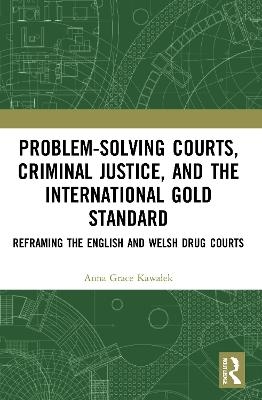
Problem-Solving Courts, Criminal Justice, and the International Gold Standard
Reframing the English and Welsh Drug Courts
Seiten
2022
Routledge (Verlag)
978-0-367-65386-6 (ISBN)
Routledge (Verlag)
978-0-367-65386-6 (ISBN)
This book discusses the role of Problem-Solving Courts within the Criminal Justice System from a therapeutic jurisprudence perspective.
This book presents findings from a process evaluation carried out at a problem-solving court located in England: Manchester Review Court. Unlike the widely documented successes of similar international models, there is no detail of Manchester Review Court in the accessible literature, not in any policy document, nor is there a court handbook or website outlining objectives and expected practice. In adopting the seminal ‘wine’ and ‘bottle’ analytical framework propounded by therapeutic jurisprudence scholars, and by carrying out a detailed comparative analysis comparing the court to successful international problem-solving courts, the original empirical data brings clarity to an overlooked area. A fidelity analysis is also offered for the forerunning English and Welsh drug courts, which were established during the early 2000s, but then shortly fell by the wayside without satisfactory explanation for why. Findings from the book shed new light on the causes of the English and Welsh drug court downfalls pending recent calls to roll out a fresh suite of problem-solving courts. In light of the international evidence base and national struggles in the field, the book proposes a renewed, UK-specific, fidelity matrix to forge the impetus for new practice in this area, whilst accounting for past failures and acknowledging current issues. Therefore, this book not only breaks new ground by advancing knowledge of a significantly uncharted area but provides important inroads for helping policymakers with their strategies in tackling recidivism, addiction, victimisation, and austerity, as widespread social and human issues currently facing both Manchester and the UK more broadly.
Presenting significant advancements in theory, policy, and practice at both national and international scale, the book will be a valuable resource for academics and practitioners working in the fields of Therapeutic Justice, Criminal Law, Criminology, Criminal Justice, and Socio-Legal Studies.
This book presents findings from a process evaluation carried out at a problem-solving court located in England: Manchester Review Court. Unlike the widely documented successes of similar international models, there is no detail of Manchester Review Court in the accessible literature, not in any policy document, nor is there a court handbook or website outlining objectives and expected practice. In adopting the seminal ‘wine’ and ‘bottle’ analytical framework propounded by therapeutic jurisprudence scholars, and by carrying out a detailed comparative analysis comparing the court to successful international problem-solving courts, the original empirical data brings clarity to an overlooked area. A fidelity analysis is also offered for the forerunning English and Welsh drug courts, which were established during the early 2000s, but then shortly fell by the wayside without satisfactory explanation for why. Findings from the book shed new light on the causes of the English and Welsh drug court downfalls pending recent calls to roll out a fresh suite of problem-solving courts. In light of the international evidence base and national struggles in the field, the book proposes a renewed, UK-specific, fidelity matrix to forge the impetus for new practice in this area, whilst accounting for past failures and acknowledging current issues. Therefore, this book not only breaks new ground by advancing knowledge of a significantly uncharted area but provides important inroads for helping policymakers with their strategies in tackling recidivism, addiction, victimisation, and austerity, as widespread social and human issues currently facing both Manchester and the UK more broadly.
Presenting significant advancements in theory, policy, and practice at both national and international scale, the book will be a valuable resource for academics and practitioners working in the fields of Therapeutic Justice, Criminal Law, Criminology, Criminal Justice, and Socio-Legal Studies.
Dr. Anna Grace Kawałek is Lecturer in the Law School, Leeds Beckett University, UK.
Chapter 1: Introduction
Chapter 2: The Evidence So Far: A Critical Review
Chapter 3: Analysis and Discussion of the "Wine"
Chapter 4: Analysis and Discussion of the "Bottle"
Conclusion
| Erscheinungsdatum | 13.07.2022 |
|---|---|
| Zusatzinfo | 29 Tables, black and white; 5 Line drawings, black and white; 5 Illustrations, black and white |
| Verlagsort | London |
| Sprache | englisch |
| Maße | 156 x 234 mm |
| Gewicht | 299 g |
| Themenwelt | Geisteswissenschaften ► Psychologie ► Allgemeine Psychologie |
| Recht / Steuern ► EU / Internationales Recht | |
| Recht / Steuern ► Strafrecht ► Kriminologie | |
| Recht / Steuern ► Strafrecht ► Strafverfahrensrecht | |
| ISBN-10 | 0-367-65386-9 / 0367653869 |
| ISBN-13 | 978-0-367-65386-6 / 9780367653866 |
| Zustand | Neuware |
| Informationen gemäß Produktsicherheitsverordnung (GPSR) | |
| Haben Sie eine Frage zum Produkt? |
Mehr entdecken
aus dem Bereich
aus dem Bereich
Techniken der Verhaltenstherapie
Buch (2024)
Julius Beltz GmbH & Co. KG (Verlag)
35,00 €


